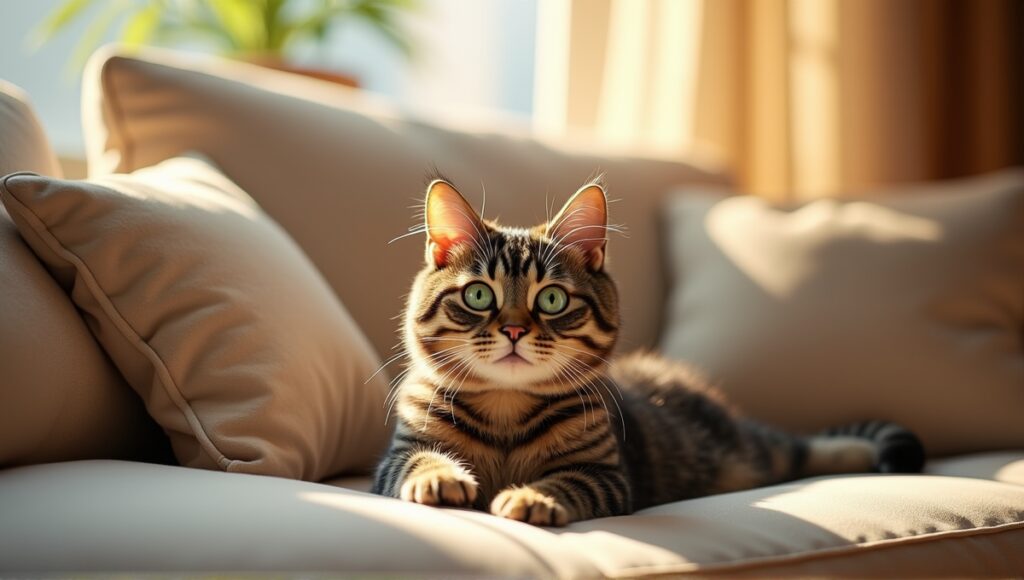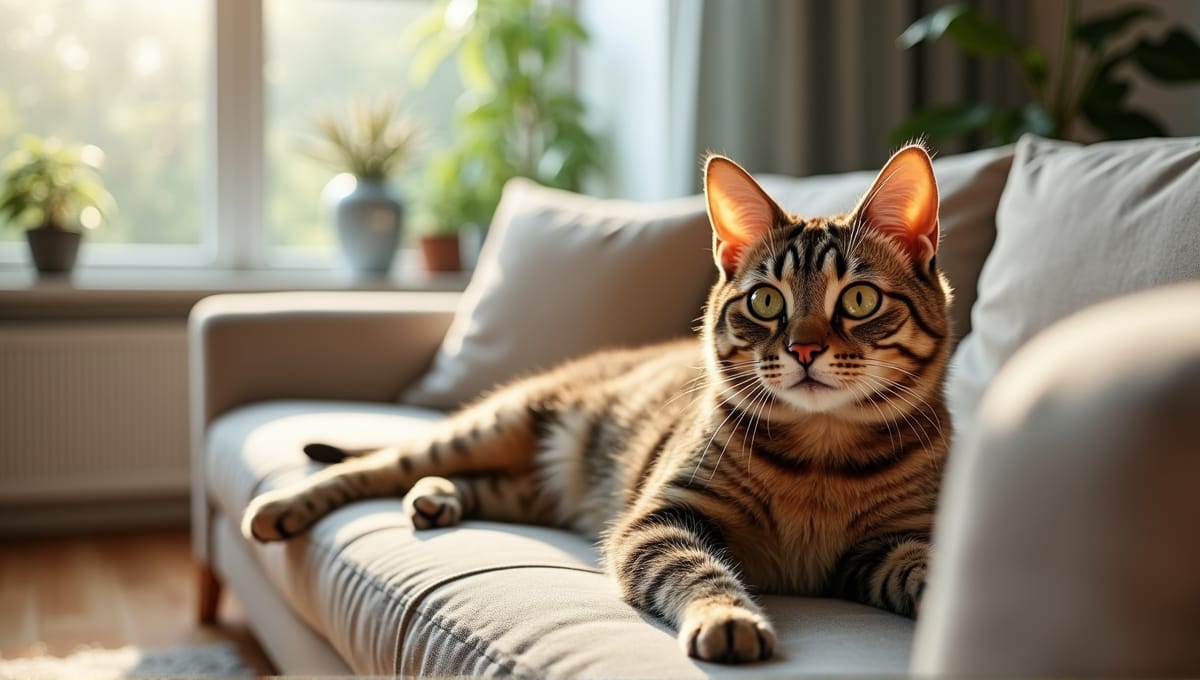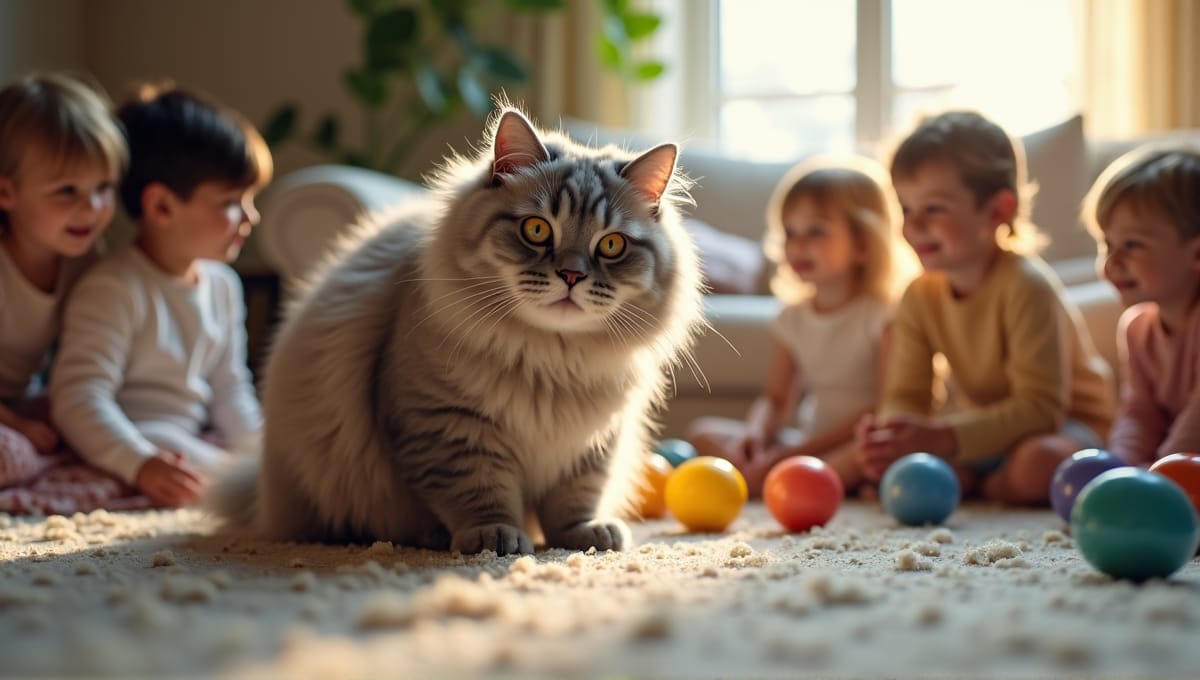The Li Hua cat is a truly unique breed with strong ties to Chinese culture. As a feline breed expert, I’ve dedicated much of my life to studying these special cats. If you’re asking yourself whether a Li Hua cat would be happy in your home, you’re about to find out. I’ll discuss their personality traits and care requirements so you can determine if this rare, intelligent breed is the right fit for you.
Origins and History of China’s Dragon Li Feline
The Li Hua cat, also known as the Dragon Li, is deeply rooted in Chinese culture as one of the many cat breeds that evolved naturally in China over centuries. People noticed the unique look and characteristics of the Li Hua, and thus the breed was born.
In January 2004, the Li Hua cat was recognized as an experimental breed in Beijing, a significant step for the breed. The next year, a Li Hua male cat named Needy achieved something remarkable. Needy won first place as CAA champion with John Douglas Blackmore of the ACFA judging.
The breed continued to gain international recognition. In February 2010, the Cat Fanciers’ Association (CFA) accepted the Li Hua cat for showing in the miscellaneous class. This decision marked a big moment for the breed to gain international recognition.
Here are the key moments in the cats recognition:
- 2004: Recognition as an experimental breed in Beijing
- 2005: CAA champion
- 2010: Acceptance into CFA for showing in miscellaneous
These moments signify the breed’s increasing popularity as people outside of China learned about the breed. The fact that the Li Hua cat went from a local breed to an international breed is impressive and speaks to the breed’s unique qualities.
Physical Characteristics of Li Hua Cats
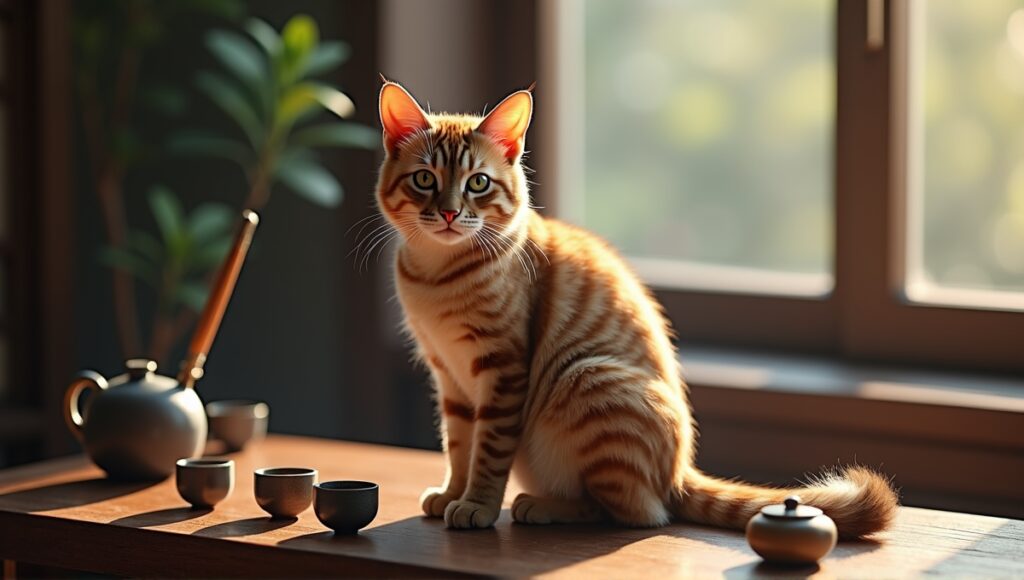
There medium-sized cats with a muscular build. They typically weigh 8 to 12 pounds, though some larger cats may weigh up to 15 pounds. In terms of height, these cats are approximately 12 to 14 inches tall at the shoulder.
One of the most notable characteristics of Li Hua cats is their coat. They have a unique mackerel tabby pattern in brown or light brown color variations. Their coat is short and dense with a slight sheen, and grooming needs are minimal.
They have a round face shape with high cheekbones. Their eyes are almond-shaped and most often yellow or green. A defining trait is their “kissing lips,” which refers to the slight upward curve at the corners of the mouth.
They have a muscular, well-balanced body structure. Their legs are strong, and they have round paws. Their tails are thick at the base and taper to a rounded end.
Growth and maturation of Li Hua cats:
- Reach full size by 1-2 years of age
- Coat pattern fully develops by 6 months
- May continue to fill out until 3 years old
- Males generally larger than females
One interesting note about them is that it takes up to three years for them to fully mature physically. As a result, the gradual growth process allows their muscular build and other distinctive traits to fully develop.
Temperament and Personality of Chinese Lihuas
I’ve personally found that there very intelligent. They are quick to learn and respond well to training. You’ll be impressed by how quickly they pick up new tricks or commands.
These cats form strong attachments to their human families. They are loving, yet not overly clingy. You’ll often find your Li Hua cat nearby, eager to participate in family activities.
In my experience, they tend to get along with other pets. They are social animals that enjoy the company of other pets. However, early socialization is important to promote good relationships.
Li Hua cats have a moderate energy level. They enjoy playtime, though they aren’t overly hyperactive. Instead, you’ll find that they manage active playtime with relaxation time quite well.
In terms of vocalization, Li Hua cats are moderate. They aren’t as vocal as some other breeds, but they will communicate when they want something. Their meows are generally soft and pleasant.
Of course, each cat is an individual. While these are typical behaviors, there may be some variation in personality. The key is to provide love, attention, and proper care to help your cat reach its full potential.
Caring for a Li Hua Cat
Taking care of a Li Hua cat is fairly easy. They have a short, dense coat that doesn’t require much grooming. A good weekly brush to remove loose fur is typically all you need. This also helps minimize shedding.
In terms of food, they do well on any quality cat food. They just need a balanced diet with plenty of protein. Consult with your veterinarian to determine the best feeding schedule and quantity of food for your Li Hua cat.
They need both physical exercise and mental stimulation. They enjoy:
- interactive toys
- puzzle feeders
Regular play sessions will keep them in good shape both physically and mentally. And you’ll also find that they’re quite capable of entertaining themselves.
Li Hua cats are generally healthy cats. However, it’s still important to schedule regular checkups with the vet. Keep their vaccinations up to date and be on the lookout for any changes in behavior or appetite.
There adaptable to a variety of living situations. They don’t need a lot of space, but it’s nice if you have some areas for them to climb. A cat tree or perch by the window will keep them entertained for hours.
If you do more research on Chinese cat breeds, you may notice other similarities with the Li Hua cat. While each breed is unique, many of these cats share similar traits due to their common background.
Chinese Mountain Felines as Companions
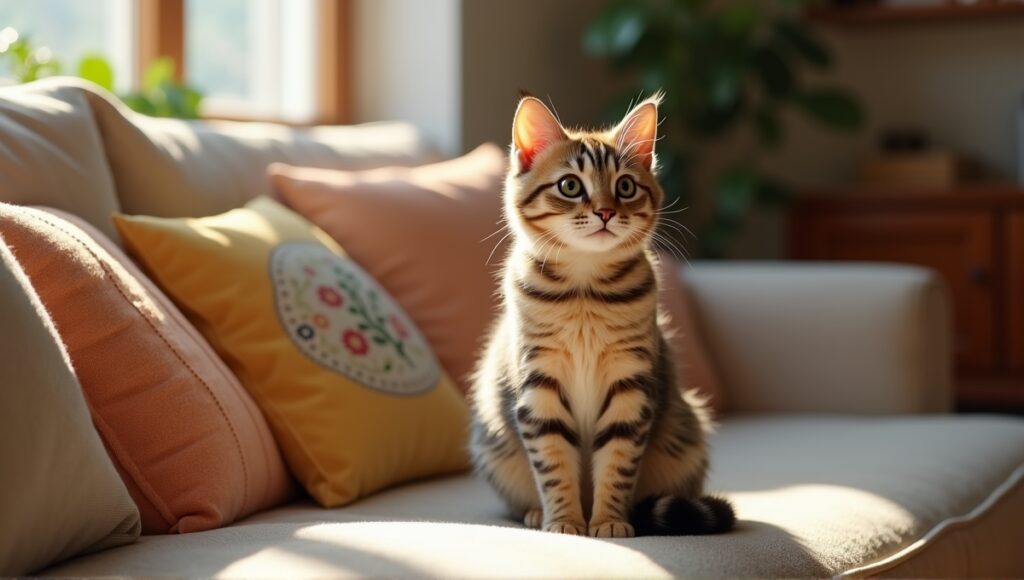
They make an excellent pet for many households. There versatile and do well in apartments and larger homes. They also transition easily to indoor living, though they enjoy occasional outdoor time if possible.
Li Hua cats are great with kids. They are very tolerant and mild-mannered, which is why they are a great playmate for children. However, always supervise your kids when they play with a cat.
The Li Hua cat requires a moderate amount of your time. While they aren’t as high-maintenance as some other cat breeds, they do crave your attention and regular playtime. You should set aside time daily for play, feeding, and general care.
Li Hua cats are wonderful companions. They are loyal and loving, without being overly needy. You’ll often find them nearby, and they like to be included in whatever you’re doing.
They are also intelligent, which makes owning one more interesting. You can even train them or invest in puzzle toys to keep them mentally sharp. This is a fun and rewarding experience for both of you.
Keep in mind that each cat is different. While these are general traits, any individual cat might differ. Therefore, spend some time with a Li Hua before making a final decision to ensure it aligns with your lifestyle.
Reproduction and Accessibility of Dragon Li Felines
Li Hua cats are fairly rare outside of China. In 2017, there were only four pedigreed Li Hua cats in the entire United States. This rarity makes them a truly unique and desirable breed for cat lovers.
There breeding programs are limited. Most are located in China, where the breed originated. Breeders’ main focus is preserving the breed’s unique characteristics and temperament.
Because they are so rare, adoption opportunities are also fairly limited. You may find luck adopting a Li Hua cat in China, or from a specific breeder. Just be sure to always verify you’re working with a reputable source when adopting.
Things to consider before getting a Li Hua cat:
- The breed’s rarity and any potential wait times
- Your long-term commitment to caring for a cat
- Whether you can meet a cat’s need for attention and play
- The cost of caring for a cat, like food, vet visits, and supplies
Cost and availability will both vary:
| Factor | Details |
|---|---|
| Purchase Price | $600 to $3000+ |
| Availability | Very limited |
| Wait Time | Months to years |
| Location | Most are in China, very few in all other countries |
Just remember, because they are such a rare breed, you might need to be patient in finding one. Therefore, make sure you do your due diligence and prepare accordingly before welcoming this unique cat into your home.
Health and Lifespan
Li Hua cats are generally very healthy thanks to their natural breeding. However, like all cats, they are susceptible to a few health issues. Common concerns include:
- Dental issues
- Obesity if you overfeed them
- Parasites if they roam outside
Preventative care is the best way to ensure your cat remains healthy. Brushing their teeth regularly can prevent most dental issues. And as long as you don’t overfeed your cat, it will likely stay at a healthy weight.
Li Hua cats follow a similar vaccination schedule as any other domestic cat. Core vaccines for cats include:
- Rabies
- Feline Panleukopenia
- Feline Calicivirus
- Feline Herpesvirus
The average lifespan is 12 to 15 years, though with excellent care, some may live even longer.
Regular check-ups with a vet are a must. For adult cats, I recommend at least an annual check-up, but kittens and senior cats need to visit the vet more often. These check-ups catch most health issues when they’re still small problems.
If you want to learn about other interesting breeds of cats, consider the Chantilly Tiffany. While this breed is different from the Li Hua, it also falls into the category of less common breeds.
Li Hua Cats in Chinese Culture
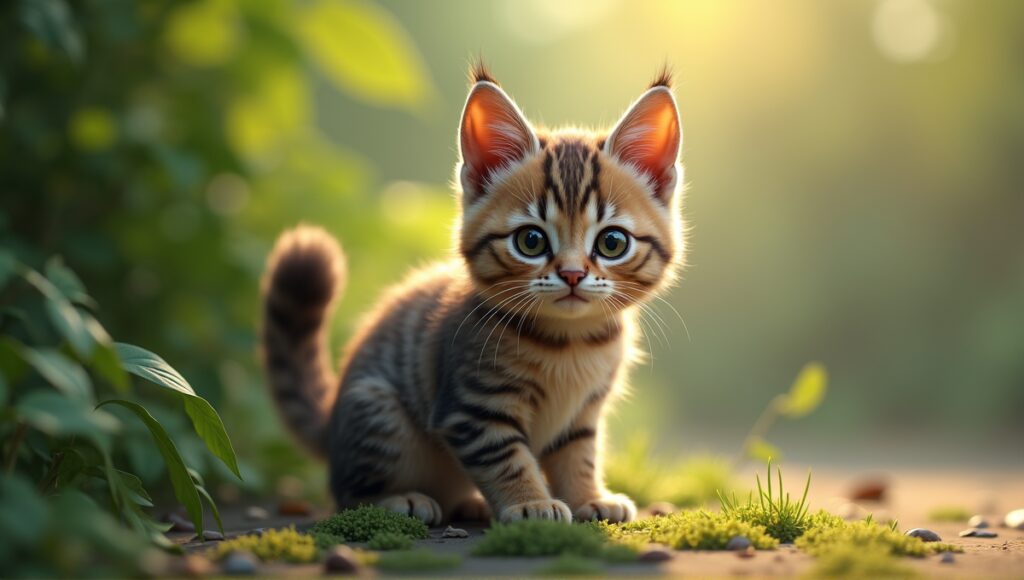
The Li Hua cat has a special role in Chinese culture as it is often considered a symbol of wealth and good luck. People believe having them in the house will bring good luck and protect the house from evil spirits.
In Chinese mythology, the Li Hua cat is linked to the dragon. This association is why some people call it the “Dragon Li.” The dragon is an auspicious and powerful creature in Chinese culture.
In ancient China, people kept them primarily as companions, but they also served a practical purpose. People valued them for their hunting abilities to help control the population of rodents.
The Li Hua cat differs from other Chinese cat breeds like the Chinese Mountain cat or Chinese White as it is more commonly featured in myths and daily life. Through that natural evolution over hundreds of years, the breed is deeply rooted in Chinese culture today.
The fact that the they is deeply ingrained in Chinese culture makes it a more fascinating breed for cat lovers. When you own a Li Hua , it’s not just a pet. You own a piece of living Chinese history.
In Summary
The Li Hua cat is a unique breed with strong ties to Chinese history. These cats are smart and exhibit a playful yet loyal personality. They also have specific physical characteristics and are very adaptable. While they’re still relatively uncommon in regions outside of China, they are becoming increasingly popular globally. Ensuring they receive proper care, frequent checkups at the vet and mental stimulation is essential to their happiness. I’ve personally experienced how these cats can brighten up a home. A Li Hua is an intriguing and excellent pet option.


